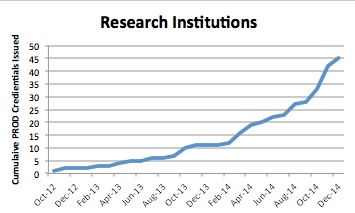It can be tough to be an early adopter. The Alfred P. Sloan Foundation generously funded a suite of ORCID integration projects to drive the uptake of ORCID iDs by universities, associations, and scholarly systems. The nine projects launched in 2013 and completed a year later, producing ORCID iD implementation use cases, promoting iD use amongst researchers, and sharing lessons, code and experiences with the wider ORCID community. The projects delivered their final reports in Fall 2014, and we are pleased to release our summary final report.
The Adoption and Integration program participants have generated a rich resource of experience, know-how, and advice that helps to shorten the learning curve for all those who follow. To give you a sense of just how much was achieved, here are some facts and figures:
- 9 projects at 7 universities, 1 association, and 1 database
- 13 new ORCID integrations, including the first ORCID requirement for graduate students submitting theses or dissertations
- Slidedecks created by the program participants were viewed more than 7,000 times
- The range of resources coming out of the programme is huge: from native integrations of ORCID iDs in VIVO and DSpace and plugins for Hydra to library guides from Texas A&M, videos from Missouri, and international conference presentations.

The success of the program was hailed by Josh Greenberg, Director of the Scholarly Communication Program at the Alfred P. Sloan Foundation, “ORCID is smart, it’s innovative, and it’s taking on a difficult problem faced by the scientific community. The success of the A&I program was due, more than anything, to the efforts of the ORCID team and the ORCID community and to hard work and long hours put in by people committed to seeing ORCID succeed. Watching what can happen when a community starts to come together is inspiring. It’s been a pleasure to be a part of it.”
You can find out more about what each project achieved by reading their use cases. The final program report contains many, many links to information and useful outputs. We have exported their wisdom far and wide, starting by enriching our knowledge base, One example is our new Member Support Center, with end-to-end technical and outreach documentation for community sectors. Further, the approach taken in the Adoption and Integration program helped to inspire the Jisc-ARMA ORCID pilot projects in the UK, which have just been completed and will be reporting soon.
The commitment and enthusiasm of our project leaders was extraordinary! They paved the way for university and association implementations around the world. University engagement with ORCID has grown from 27 new members in 2013 to 63 new organizations in 2014. 74% of new ORCID integrations in 2014 came from the higher education sector (up from 33% in 2013). As of this writing, there are over 45 live integrations in the sector. The graph above shows the acceleration in uptake from early 2014 when the projects started to communicate their progress.
Program participants observed real benefits coming from the program. The team from Boston University remarked that “we have learned that a potentially excellent opportunity may lie in the utility of ORCID to greatly facilitate the creation and tracking of various training grants… Our training program directors who have recently been in the process of submitting new and continuing grants have extremely excited by this functionality and the potential to improve their capacity to document their successes and impact”. At ORCID, we will continue to engage research funders and third party systems providing management systems and information to funders to ensure that this opportunity is seized.
The Reactome team told us that “It is possible to imagine a time not too far ahead when the ORCID platform, through online collaboration tools, like Reactome, will become integral to development and dissemination of scientific research.” ORCID’s value to global communication was also noted by the Society for Neuroscience, who integrated ORCID into their membership systems. With 40,000 members in 90 countries, 38% of whom are based outside the US, participation in a global information ecology is vital to SfN for survival.
We are all incredibly proud of what our project partners have achieved, and we are very grateful to the Alfred P. Sloan Foundation for making this possible. Take a look at the resources that have come from this amazing program, and we know that you will join us in saying a big thank you to the project teams for everything that they have done. The impact and momentum of the program are still growing, and we will be shouting from the rooftops for a good while yet. Great work everyone!
